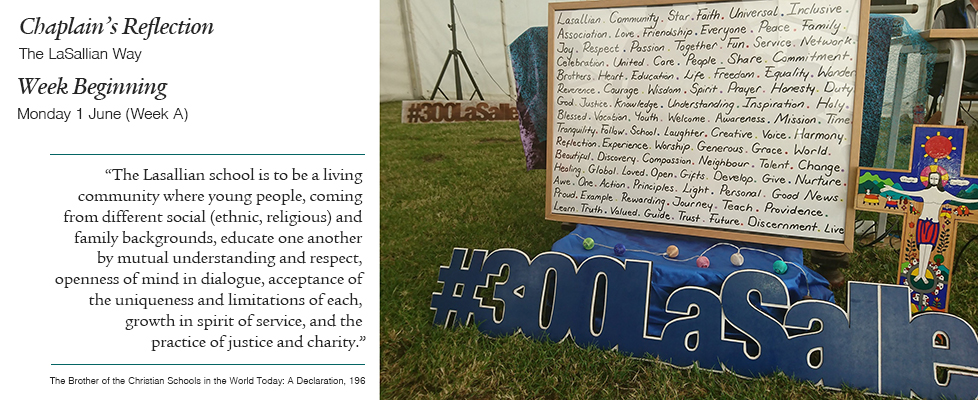Over the coming week our focus is on the the LaSallian Way, and what it means to follow in the footsteps of St John Baptiste De La Salle.
As a Catholic community we are aware of what is expected when living out our faith, how Jesus called us to follow his lead “A new commandment I give to you, love one another. As I have loved you, so you must love one another. By this everyone will know that you are my disciples.” (John 13:34-35). There’s nothing complicated in understanding what Jesus is saying here, it just gets a whole lot tougher in practise, especially when it’s someone we disagree with or someone who’s hurt us, caused us pain and so on. Jesus brought the 613 commandments of Leviticus, the 10 commandments to Moses, and summarised them as the movement of our heart matters above all else, firstly to God and then to one another “Love the Lord your God with all your heart and with all your soul and with all your mind and strength. The second is love your neighbour as yourself.” (Mark 12:30-31).
In LaSallian spirituality there is a long tradition of a call and response to begin and end times of prayer which encapsulates the instruction of Jesus we’ve just heard:
Leader: Let us remember we are in the holy presence of God.
All: And let us adore him
Leader: Live Jesus in our hearts
All: Forever
In all the years of my visits with school groups to St Cassian’s retreat centre, Kintbury, a LaSallian community, the retreat team have used these words with groups, inviting young people into the spirituality of De La Salle, and in turn reminding all retreatants of the most important instruction of Jesus Christ. The call and response invites young people (and those slightly older adults of us supervising) to find a way of ‘loving the Lord your God’ through acknowledge of such and being present in a time of prayer. The concluding call and response alludes to the second part of Jesus’ commandment, to love everyone or to at least give it our best shot, requires accepting that Jesus must live inside of us. We must become more like Christ. The greatest way to do this – allow Jesus to live in our hearts, to guide our interactions, our words, our responses, our actions -which all come from an emotional response of which the heart is the driver. It strikes me that every young person who visited Kintbury, whatever their motivation or reasoning for going along was, came away instinctively able to use those two call and responses, and willing to.
The LaSallian five core principles explore how allowing Jesus to live through us and in our hearts can find a framework. They include all avenues of our society that Jesus would have expected us to navigate towards if we are to truly love our neighbour:

I’d like to conclude by leaving you with some extracts from a well-respected De La Salle brother from America, Luke Salm, he wrote extensively on LaSallian history, formation and spirituality including this section on what it means to allow Jesus to live in our hearts. Brother Luke passed away in 2009.
For more than three centuries now it has been the custom of the De La Salle Christian Brothers, whether in the community or in the school, to conclude every prayer session with the expression “Live Jesus in our hearts forever!” In today’s world, the Lasallian mission, along with the spirituality that drives the mission, has been undertaken by associates and partners. They too have become accustomed to ending prayer in the classroom and at gatherings or solemn assemblies with the same invocation. Just as the recollection of the presence of God begins Lasallian prayer, so too the expectation that Jesus will live in Lasallian hearts brings prayer to an end.
This prayer comes directly from St. John Baptist de La Salle. It is found in the earliest versions of the Rule composed for the Brothers by their Founder, going back to the daily regulations decided on in the first assembly of the principal Brothers in 1686. In Chapter 27 of the primitive Rule, it is prescribed that the Brother appointed should ring the rising bell at 4:30 AM and then say in a loud voice “Live Jesus in our hearts!” to which the Brothers would respond “Forever!” The text the goes on to say “This is the signal of the community.” In time it became a way of terminating all the community prayer sessions, and even the recreations, during the course of the day.
Little by little, the Brothers began to use it in the schools as a way of ending the scheduled prayers. Just as “Let us remember that we are in the holy presence of God,” originally used only in the school prayers, found its way into the community, so “Live Jesus in our hearts!” migrated from the community to the schools. The invocation “Live Jesus in our hearts “ was not, however, original with De La Salle. It is found in a variety of forms in many of the French spiritual writers of the 17th century. St. Francis de Sales (d.1622), for example, writes in his Introduction to the Devout Life “Live, Jesus! Live, Jesus! Yes, Lord Jesus, live and reign in our hearts forever and ever. Amen.” And again, in his Treatise on the Love of God “Live, Jesus! Jesus, I love! Live, Jesus whom I love!”.
The goal of Christian spirituality, then, is to identify with Jesus living within us, not only by imitating his way of life but, more deeply, by making one’s own the mentality, the mind set, the “heart” of Jesus in the various events of his life, especially his self-surrender to the will of his heavenly Father. A key text, expressive of this attitude of total self-effacement, is the kenotic hymn in the Epistle to the Philippians: “Let this mind be in you, which was in Christ Jesus who, though he was in the form of God did not consider equality with God as something to be exploited, but emptied himself taking the form of a slave …” (Phil. 2, 5-11).
The spiritual writers of the French school found abundant evidence in the New Testament that led them to contemplate and foster communion with Jesus living within us. Thus, Saint Paul to the Galatians: “It is no longer I who live but Christ who lives within me” (Gal. 2, 20), and to the Ephesians “I pray that … Christ may dwell in you hearts through faith” (Eph. 3, 16-17). In his last discourse as recorded in John’s Gospel Jesus says very pointedly “Because I live, you also will live. On that day you will know that I am in my Father, and you in me, and I in you” (Jn. 14, 19-20).
We Lasallians are often reminded that it is this Jesus who lives in our hearts. In the spirit of faith that De La Salle wanted to be the spirit of his Institute, we are caught up in faith into the mystery of the incarnation. This Jesus in our hearts is one with us in his humanity, one with God in his divinity. Lasallians have an answer to the question Jesus once put to the Apostle Peter: “But who do you say that I am?”
What a powerful symbol is the heart! It is used to refer to the seat of emotion, especially the emotion of love, that points beyond emotion to the full reality of self-giving love. The heart thus becomes the symbol of the self. When Jesus invites us to learn of him because he is meek and humble of heart, he is telling something about himself. Sometimes the heart is set in contrast to the head, as something warmer, more subjective, more personal, more than purely intellectual. Thus when we ask that Jesus live in our hearts we do more than say that we believe doctrines about Jesus. We take the person of Jesus into our very selves, into our subjectivity, into our hearts. As Christians we become so united to Jesus living within us that we become other Christs to those we serve.As an expression of Lasallian spirituality, “Live Jesus …” cannot reflect a spirituality divorced from community and from mission. It is significant that the prayer refers to Jesus living in our hearts. The life of Jesus within us is something we share in a Lasallian educational community. The warrant for this comes from the words of Jesus: “Wherever two or three are gathered in my name, there am I in the midst of them” (Mt 18, 20). The presence of Jesus among us gives life and motivation to our Lasallian association for the educational mission, which is the mission of Jesus himself, that “the poor have the Gospel preached to them.” It is with Jesus in our hearts that we become capable of “touching hearts,” as De La Salle so often urged his followers to do. One in Christ and in one another, “we are all in this together.”. “Live Jesus … Forever!” sends Lasallians away from formal prayer in the hope and belief that the presence of Jesus in their hearts is something that continues, that all else that comes from the heart, especially the sense of mission, is energized by the ongoing presence therein of the very self of Jesus.




